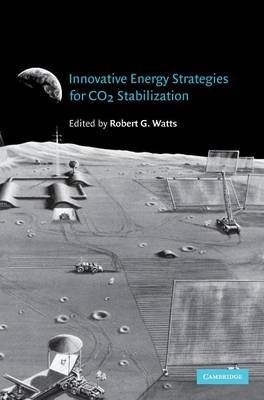
Innovative Energy Strategies for CO2 Stabilization
Cambridge University Press (Verlag)
978-0-521-80725-8 (ISBN)
The vast majority of the world's climate scientists believe that the build-up of heat-trapping CO2 in the atmosphere will lead to global warming unless we burn less fossil fuels. At the same time, energy must be supplied in increasing amounts for the developing world to continue its growth. This book discusses the feasibility of increasingly efficient energy use and the potential for supplying energy from sources that do not introduce CO2. The book analyses the prospects for Earth-based renewables: solar, wind, biomass, hydroelectricity, geothermal and ocean energy. It then discusses nuclear fission and fusion, and the relatively new idea of harvesting solar energy on satellites or lunar bases. It will be essential reading for all those interested in energy issues, including engineers and physicists (electrical, mechanical, chemical, industrial, environmental, nuclear), and industrial leaders and politicians. It will also be used as a supplementary textbook on advanced courses on energy.
Robert G. Watts is a Professor of Mechanical Engineering at Tulane University in Louisiana. His current research interests are in climate modeling, the socio-economic and political aspects of energy policy, and the physics of sea ice. His publications on these and other topics have appeared in Climatic Change, the Journal of Geophysical Research and Nature as well as the mechanical engineering literature. Professor Watts is the author of Keep Your Eye on the Ball: Curveballs, Knuckleballs, and Fallacies of Baseball (with A. Terry Bahill, 1991, 2000) and is editor of Engineering Response to Global Climate Change (1997). He is a member of the American Society of Mechanical Engineers, and has been an ASME Distinguished Lecturer. Recently, he gave the prestigious George Hawkins Memorial Lecture at Purdue University.
1. Concerns about climate change and global warming Donald J. Wuebbles, Atul K. Jain and Robert G. Watts; 2. Posing the problem Robert G. Watts; 3. Adaptive strategies for climate change Robert J. Lempert and Michael E. Schlesinger; 4. Energy efficiency: a little goes a long way Susan J. Hassol, Neil D. Strachan and Hadi Dowlatabadi; 5. The potential of renewable energy to reduce carbon emissions Walter Short and Patrick Keegan; 6. Carbonless transportation and energy storage in future energy systems Gene D. Berry and Alan D. Lamont; 7. What can nuclear power accomplish to reduce carbon dioxide emissions? Robert Krakowski and Richard Wilson; 8. Nuclear fusion energy Arthur W. Molvik and John L. Perkins; 9. Energy prosperity within the twenty-first century and beyond: options and the unique roles of the Sun and the Moon David R. Criswell; 10. Geoengineering the climate: history and prospect David W. Keith; Index.
| Erscheint lt. Verlag | 11.7.2002 |
|---|---|
| Zusatzinfo | 36 Tables, unspecified; 3 Halftones, unspecified; 102 Line drawings, unspecified |
| Verlagsort | Cambridge |
| Sprache | englisch |
| Maße | 170 x 244 mm |
| Gewicht | 940 g |
| Themenwelt | Technik ► Elektrotechnik / Energietechnik |
| Technik ► Umwelttechnik / Biotechnologie | |
| ISBN-10 | 0-521-80725-5 / 0521807255 |
| ISBN-13 | 978-0-521-80725-8 / 9780521807258 |
| Zustand | Neuware |
| Haben Sie eine Frage zum Produkt? |
aus dem Bereich


